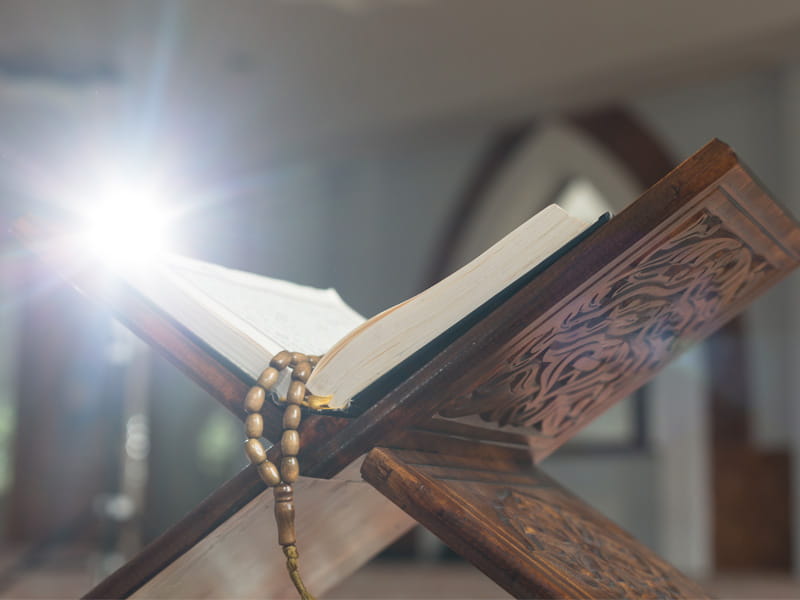Ahmed, whose job in information technology takes him across his state, saves his most intense prayer for when his forehead and nose touch the ground. From that posture, he said, he asks God to forgive him and his parents so they can someday enter paradise.
"In the prostrate position you're the most humble, with your head on the floor," he said, explaining why he chooses that prescribed prayer position to ask for what observant Muslims desire most.
"It's the most vulnerable position you can be in. You're completely submissive at that point."
Not all Muslims follow their religion's rules on praying five times a day. But for maybe five to 15 minutes at dawn and again at noon, midafternoon, sunset and just before going to bed, Ahmed and other observant Muslims try to focus on God and put aside whatever is going on around them.
Finding the right time and place to pray each day can be challenging.
At least two prayer times occur during typical work hours. Stopping to pray at one's workplace when others are not is a constant reminder of living in a secular, non-Muslim society, many Muslims said.
Arranging to pray tends to be easier for professionals than for hourly workers such as cab drivers, said Yaser El-Menshawy, president of the Council of Mosques in New Jersey.
"Professionals generally don't have a problem. You have an office, a cubicle, you have a place. But if you're working in a garage, sometimes it gets difficult," he said.
A dozen people interviewed after evening prayers at Ahmed's mosque, the Islamic Society of Central Jersey, said their biggest challenge with prayer is the mental preparation needed to clear their minds for God while the world goes on around them. "That's what we all struggle to do. That's what you're trying to perfect," said Javed Khan. "It's very difficult. Once you go into salaat (prayer), you're supposed to break the bonds to the world. You're talking to Allah."
Muslims' prayer rituals begin before the prayers themselves, with a washing meant to purify. Muslims are supposed to apply water to their hands, face, arms up to the elbow, hair and feet. Tradition generally allows a Muslim to satisfy the foot-washing requirement by dabbing some water on the top of shoes or socks.
Prayer itself, prescribed by Islamic holy books, starts with the recitation of the short first chapter of the Quran, called Al-Fatihah ("The Opening"):
"In the name of Allah, the entirely merciful, the especially merciful. All praise is for Allah, the Lord of the worlds. The entirely merciful, the especially merciful. Sovereign of the Day of Recompense. It is you we worship and you we ask for help. Guide us to the straight path--the path of those upon whom you have bestowed favor, not of those who have evoked (your) anger or of those who are astray."
Muslims can pray anywhere free of dirt except a bathroom. Portable prayer rugs provide instant clean space. And Muslim tradition holds that prayer said along with other Muslims counts more than prayer said alone.
Simple repetition of the Arabic words commonly used in prayer can help put someone in the right mind-set, though relying too much on that can detract from the spiritual experience, said Wajed Syed, who works as an engineer.
"Once you start praying, you're saying the same thing over and over again," he said. "If we don't remember the meaning and concentrate, it becomes mechanical. The words will come out from the mouth automatically, because you have memorized those words. ... You then have to think, because if you are doing mechanical prayer, then it is not accepted" by God.
At the Islamic Society, most Muslims said they have been able to find ways to pray during the workday.
Aarfat Kazi said he usually walks to a mosque near his office to pray, but when it's cold, he and two colleagues are allowed to pray in an office conference room that is also used at a different time each afternoon for prayer by about 20 Orthodox Jewish employees.
"During wintertime, that's what we do," Kazi said. "We gather in the conference room and we do our prayer. ... I keep my prayer rug with me."
Ahmed, who regularly travels to new job sites, said he uses a Web site (www.islamicfinder.com) in advance to find a nearby mosque.
"Whenever I go to a new place to work, I always tell the immediate supervisor I'm working for that on Friday I'll be taking off" for a while, Ahmed said. "I've never encountered a problem. One supervisor said, `Go into (Microsoft) Outlook and mark the spot as an ongoing meeting every Friday."'
SOUTH BRUNSWICK, N.J.- Whether at work, at home or in a mosque, Imtiaz Ahmed tries to block out the world around him five times a day and concentrate on God, bowing, kneeling and prostrating in prayer as all observant Muslims do.

